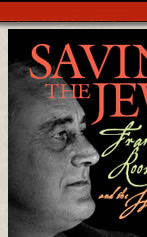

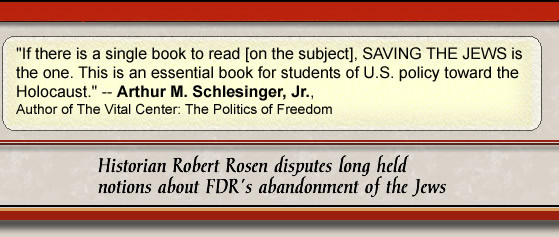


|
Reviews |
|
|
|
|
|
|
Why I Wrote The Book |
|
|
Excerpts |
|
|
Table Of Contents |
|
|
Auschwitz |
|
|
SS St. Louis |
|
|
Timeline |
|
|
A Survivor Speaks Out |
|
|
Carter Center Speech |
|
|
Justice At Nuremberg |
|
|
Purchase |
|
|
Related Links |
1933 |
||
| January 30 | President von Hindenburg appoints Adolf Hitler Reich Chancellor | |
| February 27 | The Reichstag in Berlin is set on fire | |
| March 4 | Franklin D. Roosevelt is inaugurated as President of the United States | |
| March 20 | The first concentration camp is opened at Dachau near Munich | |
| April 1 | Nazi boycott of Jewish-owned businesses | |
| July 20 | Nazi Germany and the Vatican sign a concordat guaranteeing the rights of the Catholic Church in Germany | |
| August 25 | German officials and Zionist representatives sign the “Haavra (Transfer) Agreement” Boycott of Germany by Jewish groups in the United States Anti-Nazi rally in New York City | |
| December 5 | Otto and Edith Frank move their family to Amsterdam | |
1934 |
||
| June 30 | “Night of the Long Knives.” Hitler has his Nazi rivals murdered | |
| August 2 | Hindenburg dies | |
1935 |
||
| March 1 | Germany occupies the Saar | |
| May 27 | NIRA declared unconstitutional | |
| August 14 | Social Security Act passed | |
| September 15 | The Nuremberg Racial Laws are announced at a Nazi Party rally in Nuremberg | |
| December | Otto and Margot Frank visit Switzerland | |
1936 |
||
| March 7 | Hitler repudiates the Versailles and Locarno Treaties as German troops occupy the Rhineland |
|
| April 19 | Outbreak of Arab Revolt in Palestine (1936-1939) | |
| May 5 | Fall of Ethiopia to Italy |
|
| July 16 | The Spanish Civil War begins. It continues until 1939 | |
| October 25 | Germany and Italy establish the Rome-Berlin Axis | |
| November 7 | FDR re-elected president for second term |
|
| November 25 | Germany and Japan sign the Anti-Comintern Pact, directed at the Soviet Union |
|
1937 |
||
| February | FDR’s Supreme Court - packing plan | |
| July 7 | Japanese forces invade northern China | |
| July 16 | Buchenwald concentration camp opens | |
| August | Hundreds of attacks on Jews in Poland | |
| December 28 | Antisemitic government installed in Romania |
|
1938 |
||
| March 12 | The German army marches into Austria and the formal union (Anschluss) of Austria with Germany takes place |
|
| April | FDR forms the President’s Advisory Committee onPolitical Refugees (PACPR) |
|
| April 26 | The “Decree Regarding Registration of Jewish Property” requires all Jews in Germany to register their assets |
|
| May 16 | First Jews begin forced labor in Mauthausen concentration camp |
|
| July 6-15 | Évian Conference on Refugees | |
| August | FDR begins trying to ransom German Jewry | |
| September 29-30 | Germany, Great Britain, France, and Italy sign the Munich Agreement approving Germany’s annexation of the Sudetenland |
|
| November | FDR’s attempted “purge” of conservative Democrats |
|
| November 7 | Herschel Grynszpan assassinates Ernst vom Rath | |
| November 9-10 | The Crystal Night (Kristallnacht) pogrom takes place throughout Germany and Austria |
|
| December | Establishment of Mossad for Aliyah B (illegal immigration to Palestine) |
|
1939 |
||
| January | Debate over the Wagner-Rogers immigration bill | |
| January 17 | Felix Frankfurter confirmed by a unanimous Senate vote to the United States Supreme Court |
|
| January 30 | Hitler speaks to the Reichstag, threatening the annihilation of the Jews in Europe in the event of a war |
|
| March 15 | German forces occupy Prague, Bohemia and Moravia | |
| March 28 | Franco marches into Madrid. Fascists are victorious in Spanish Civil War |
|
| March 31 | Great Britain and France guarantee the sovereignty of Poland. |
|
| April 15 | FDR’s telegram to Hitler and Mussolini asking for assurances of non-aggression |
|
| May 15 | Establishment of Ravensbrück concentration camp for women |
|
| May 17 | The British White Paper on Palestine establishes a limit on Jewish immigration |
|
| May and June | Over nine hundred Jews attempt to emigrate from Germany on board the steamship SS St. Louis in May, but are forced to return to Europe in June |
|
| July 20 | The Coordinating Foundation is established |
|
| August 23 | The Nazi-Soviet Nonaggression Pact is signed in Moscow | |
| September | FDR continues his efforts to ransom German Jewry by supporting the Rublee Plan and insisting on the Coordinating Foundation |
|
| September 1 | Germany invades Poland. The beginning of World War II in Europe |
|
| September 3 | Great Britain and France declare war on Germany | |
| September 12 | Bombing of Warsaw by Luftwaffe | |
| September 17 | Soviet forces enter eastern Poland |
|
| September 21 | Germany orders the expulsion of Poles, Jews, and Gypsies from the Polish territories to be incorporated into the Reich |
|
| September 27 | Warsaw surrenders |
|
| October 1 | German authorities begin the deportation of Jews |
|
| October 8 | First Jewish ghetto established | |
1940 |
||
| January 4 | The first gassing of disabled patients by the Nazis |
|
| February 8 | Lodz ghetto established | |
| April 7 | Germany invades Denmark and Norway | |
| April 27 | Himmler orders the establishment of a concentration camp at Auschwitz (Oswiecim, Poland) |
|
| May 10 | Germany launches its offensive against the Low Countries and France. Rotterdam bombed by Germans Neville Chamberlain resigns as British prime minister and is replaced by Winston Churchill |
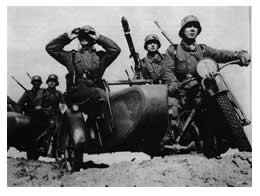 |
| May 15 | The Netherlands surrender to the Germans | |
| May 16 | FDR tells Congress “These are ominous days...we have seen the treacherous use of the ‘fifth column’” |
|
| May 17 | Germany invades France |
|
| May 24-28 | British cabinet wrestles with the decision to continue the war against Germany |
|
| June 10 | Roosevelt’s speech at the University of Virginia warning Mussolini | |
| June 14 | German troops enter Paris The first prisoners, more than seven hundred Poles, arrive at Auschwitz |
|
| June 22 | France Surrenders | |
| August 13 | The German bombing campaign against England, the Battle of Britain (“the Blitz”) begins |
|
| August 15 | Madagascar Plan | |
| September 2 | United States agrees to provide Great Britain with fifty destroyers in return for bases |
|
| September | SS Quanza incident in Norfolk, Virginia | |
| September 27 | Tripartite (Axis) Pact between Germany, Italy and Japan |
|
| October 12 | Warsaw ghetto established |
|
| November 7 | FDR reelected president for a third term; Wendell Willkie loses |
|
| November 15 | Warsaw ghetto sealed |
|
| December 29 | FDR’s “Arsenal of Democracy” speech |
|
1941 |
||
| January 6 | FDR’s “Four Freedoms” Charlie Chaplain’s “The Great Dictator” |
|
| March 11 | The Lend-Lease Act is signed by President Roosevelt | |
| May | Spy Tyler Kent is arrested in London |
|
| May 20 | The Germans stop all Jewish emigration from Belgium and France |
|
| May 27 | FDR announces “unlimited national emergency” Rommel advances in North Africa |
|
| June 22 | “Operation Barbarossa,” the German invasion of the Soviet Union, begins |
|
| June 23 | SS Einsatzgruppen and Ordnungspolizei units begin exterminating Jews and Gypsies in the Soviet Union |
|
| June 27 | Hungary joins the Axis and enters the war |
|
| June 29 | State Department tightens visa procedure | |
| July | Franks travel to visit relatives |
|
| August 1 | Franks travel to visit relatives |
|
| August 9-14 | British Prime Minister Winston Churchill and United States President Franklin D. Roosevelt meet aboard warship and sign the Atlantic Charter |
|
| August 23 | Himmler issues a directive ordering a halt to all Jewish emigration |
|
| September 3 | About nine hundred people, mostly Russian prisoners of war, are gassed at Auschwitz. Vilna ghetto established | |
| September 8 | Siege of Leningrad begins | |
| September 19 | Fall of Kiev | |
| September 29-30 | SS Einsatzkommando murders more than thirty-three thousand Kiev Jews at Babi Yar |
|
| October | Otto Frank’s business in Amsterdam is “Aryanized.”He transfers business to Jan Gies |
|
| October 12 | The German army reaches the outskirts of Moscow. Warsaw ghetto established | |
| October 15-23 | All Jewish emigration from Germany is prohibited. Mass deportations of German Jews begins |
|
| November 1 | Construction of the Belzec extermination camp begins |
|
| November 24 | Theresienstadt “model camp” established |
|
November 30 –December 1 |
First transports arrive at Majdanek | |
| December 7 | Japan bombs the U.S. naval base at Pearl Harbor, Hawaii | |
| December 8 | Japan attacks the Philippines | |
| December 7-8 | The SS opens the first extermination camp at Chelmno near Lodz in western Poland. First use of mobile gas vans |
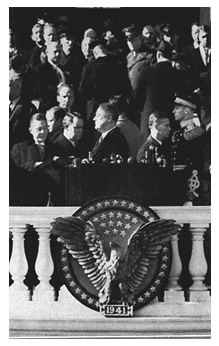 |
| December 10 | Prince of Wales and Repulse sunk |
|
| December 11 | Germany and Italy declare war on the United States | |
| December 22 | Churchill and FDR meet in Washington |
|
| December 25 | British troops in Hong Kong surrender to the Japanese | |
1942 |
||
| December 8 | Breckinridge Long becomes special assistant secretary of state in charge of emergency war matters | |
| January | Rationing begins in the United States |
|
| January 2 | Manilla, capital of the Philippines, surrenders to the Japanese Executive order 9066, signed by President Roosevelt, orders all Japanese Americans living on the West Coast of the United States into internment camps |
|
| January 13 | The St. James Palace Declaration on war crimes |
|
| January 20 | The Wannsee Conference in Berlin to coordinate the Final Solution | |
| February 15 | Singapore surrenders |
|
| February 23 | The Struma sinks off the Turkish coast | |
| March 1 | Construction begins on the Sobibor extermination camp | |
| March 19-20 | The Belzec extermination camp begins killing Jews deported from Lvov |
|
| March 20 | Mass gassings of Jews from Upper Silesia begin at Auschwitz-Birkenau | |
| March 27 | The first Jews are deported from France to Auschwitz | |
| April | The Franks are required to wear yellow star. Anne Frank buys her diary |
|
| April 9 | American forces surrender to the Japanese at Bataan. Bataan Death March begins | |
| May 6-11 | Biltmore (Zionist) Conference in New York City demands establishment of Jewish commonwealth | |
| May 7 | Opening of Sobibor extermination camp | |
| May 7 | Battle of the Coral Sea | |
| May 29 | Jews in occupied France are required to wear the yellow badge |
|
| June 2 | Polish Bund and BBC report seven hundred thousand Jews killed in Poland (New York Times carries report on July 2) | |
| June 4-7 | The U.S. Navy defeats the Japanese fleet at the Battle of Midway |
|
| June 10 | German forces murder all the men and some women in the village of Lidice, Czechoslovakia | |
| June 21 | Surrender of British at Tobruk |
|
| July 5 | Anne Frank and her family move into a secret annex constructed in the top stories of her father’s office building in Amsterdam | |
| July 15 | The deportation of Jews from Holland to Auschwitz begins
The Treblinka death camp begins receiving Jews from Warsaw. It is the last of the three camps, along with Belzec and Sobibor, created to exterminate Polish Jews |
|
| July 21 | Mass demonstration at Madison Square Garden and in New York City sponsored by AJ Congress and B’nai B’rith against Nazi massacres of Polish Jews |
|
| July 23 | The mass murder of Jews at Treblinka begins |
|
| August 8 | Riegner’s telegram to Rabbi Wise describing his belief in Final Solution |
|
| August 19 | The Battle of Stalingrad begins Battle for Guadalcanal |
|
| August 21 | FDR warns Germans that war criminals would face “fearful retribution” |
|
| September 13 | Germany begins its attack on the Soviet city of Stalingrad | |
| September - October | Efforts by FDR and State Department to save five thousand Jewish children in France |
|
| October 7 | FDR warns Germans again and United States announces creation of United Nations Commission for the Investigation of War Crimes to prosecute the guilty | |
| October 23 | The battle of El Alamein in Egypt begins | |
| October 27 | Japanese withdraw at Guadalcanal |
|
| November 2 | British victory at El Alamein | |
| November 7-8 | Operation Torch, the invasion of North Africa, begins as Allied troops land in Morocco and Algeria |
|
| November 11 | Germans occupy Vichy France | |
| November 24 | Welles confirms massacre of Jews to Wise; Wise makes facts public that two million Jews were dead. Actually, approximately three and a half million Jews were dead |
|
| December 2 | Day of mourning in major American cities for the Jews of Europe |
|
| December 8 | Rabbi Wise and four other Jewish leaders meet with FDR | |
| December 17 | United Nations Declaration on Jewish Massacres issued by FDR, Churchill, Stalin and Allied governments-in-exile |
|
1943 |
||
| January | German rabbi Leo Baeck is arrested and sent to the Theresienstadt concentration camp in Czechoslovakia, where he remained until after the camp is liberated by the Soviets at the end of World War II |
|
| January 14-24 | Roosevelt and Churchill meet at Casablanca. FDR’s conference with Noguès |
|
| February 2 | The German Sixth Army at Stalingrad surrenders to Soviet forces; Battle of the Atlantic is raging | |
| March 9 | “We Will Never Die” rally at Madison Square Garden |
|
| April 13 | The discovery of mass graves at Katyn containing the bodies of thousands of Polish officers massacred by the Soviet Union |
|
| April 19 | Bermuda Conference on Refugees convenes | |
| April 19-May 26 | Warsaw Jewish ghetto uprising | |
| April 30 | The Bergen-Belsen concentration camp is opened | |
| May 7 | Tunis falls to the Allies |
|
| May 12 | Trident Conference in Washington, FDR meets with Churchill |
|
| June 1 | Liquidation of Lvov ghetto begins | |
| June 23 | Peenemünde rocket site discovered by Allies | |
| June 28 | All five crematoriums completed at Auschwitz-Birkenau | |
| July 4-22 | The Battle of Kursk | |
| July 9 | Allies invade Sicily | |
| July 22 | Rabbi Wise meets with FDR on proposals concerning Romanian and French Jews |
|
| July 25 | Mussolini is dismissed as head of government in Italy and arrested | |
| July 28 | FDR meets with Jan Karski | |
| August | Riegner and Lichtheim report four million Jews are dead |
|
| August 1 | USAAF raids on Ploesti oil fields | |
| August 17 | Peenemünde bombed | |
| September 3 | The Allies land in southern Italy. | |
| September 9 | The German army occupies parts of Italy. | |
| September 23 | Vilna ghetto liquidated | |
| October 1 | Rescue of Danish Jews | |
| October 6 | March of four hundred Orthodox rabbis in Washington | |
| October 20 | United Nations War Crimes Commission established | |
| November 3 | Nazi authorities launch Operation Harvest Festival. By the end of November the three extermination camps used in Operation Reinhard - Sobibor, Treblinka, and Belzec - are closed. |
|
November 28- December 1 |
Churchill, Roosevelt, and Stalin meet in Teheran | |
1944 |
||
| January 16 | Morganthau and Treasury staff meet with FDR | |
| January 22 | President Roosevelt creates the War Refugee Board. Allies land at Anzio |
|
| February 1 | The Irgun declares war on the British in Palestine | |
| February | Primo Levi is sent to Auschwitz | |
| March 6 | First large-scale daylight bombing of Berlin by USAAF |
|
| March 19 | German forces occupy Hungary; Horthy arrested |
|
| March 24 | FDR condemns the massacre of the Jews as “one of the blackest crimes of all history” and promises swift punishment of the Nazis |
|
| April 5 | Ploesti bombed by USAAF based at Foggia, Italy |
|
| April 25 | “Blood for Goods” deal offered by Eichmann to Joel Brand | |
| April 27 | German authorities begin the deportation of Jews from Hungary to Auschwitz |
|
| May 19 | Joel Brand arrives in Istanbul |
|
| June 4 | United States troops enter Rome |
|
| June 6 | D-Day. The Western Allies land in Normandy in France | |
| June 8 | FDR approves Oswego shelter | |
| June 11 | Jewish Agency Executive votes 11 to 1 not to request bombing of Auschwitz |
|
| June 13 | First V-1 missiles hit England | |
| June 18 | Rosenheim requests bombing of Auschwitz | |
| June 22 | Operation Bagration along an eight-hundred-mile front in White Russia (now Belarus). The Soviets inflict immense losses on the Germany army and drive them back almost four hundred miles Kubowitzki writes Pehle opposing bombing of Auschwitz |
|
| July 9 | Horthy orders a halt to the deportation of Jews from Hungary to Auschwitz; four hundred, thirty-seven thousand, four hundred, two Hungarian Jews killed at Auschwitz; Raoul Wallenberg arrives in Budapest |
|
| July 20 | A small group of German army officers, eager to end the war, unsuccessfully attempts to assassinate Adolf Hitler |
|
| July 25 | Soviet forces liberate Majdanek | |
| August 1 | Polish uprising against the Germans in Warsaw | |
| August 4 | After living undetected for twenty-five months, Anne Frank and her family, and the four others hiding in the secret annex are reported to the Nazis. The annex dwellers are all sent to the Auschwitz concentration camp |
|
| August 15 | American forces land in southern France | |
| August 24 | Paris is liberated |
|
| August 25 | Antonescu is overthrown; Romania declares war on Germany | |
| September 8 | First V-2 missiles hit London | |
| September 17 | Operation “Market Garden” | |
| October 2 | German troops crush Warsaw Polish uprising | |
| October | Industrialist Oskar Schindler is granted permission by the Nazis to establish a munitions factory in Czechoslovakia United States General Douglas MacArthur returns to liberate the Philippines from Japanese control |
|
| October 9 | Moscow Conference |
|
| October 15 | Horthy announces a truce with the Allies. The Horthy government is overthrown by the Fascist Arrow Cross Party with German support | |
| October 23-26 | The largest naval battle in history, the Battle of Leyte Gulf, in the Philippines, ends in almost total destruction of the Japanese fleet. | |
| November 2 | The gassings at Auschwitz are stopped | |
| November 5 | Eichmann deports Jews from Budapest on foot in death marches to Austria | |
| November 7 | FDR is reelected president for a fourth term. Lord Moyne is assassinated by the Stern Gang |
|
| November 25 | Destruction of the crematoriums at Auschwitz by Germans begins | |
| December 16 | Battle of the Bulge, a major counteroffensive by the Germans against the Allies | |
1945 |
||
| January 12 | Soviets launch an offensive along the entire Polish front, entering Warsaw on January 17 and Lodz two days later. By February 1, they are within one hundred miles of the German capital of Berlin |
|
| January 17 | Russian troops liberate Warsaw | |
| January 18 | Sixty thousand Auschwitz prisoners are sent on death marches to camps in the West | |
| January 27 | Soviets liberate Auschwitz | |
| February 4-11 | Allied leaders Churchill, Roosevelt and Stalin meet in Yalta in the Soviet Union to discuss strategies for ending the war and to plan future forms of government for Germany and other parts of Europe |
|
| February 13 | Allied bombing of Dresden | 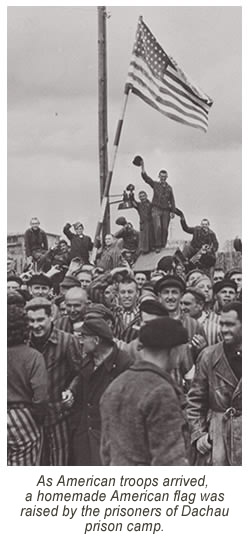 |
| February 14 | FDR meets with Ibn Saud |
|
| February 19 | American marines land on Iwo Jima | |
| March 7 | American forces cross the Rhine at Remagen | |
| April 1 | American troops land on Okinawa, beginning the largest land battle of the Pacific War; Japanese forces there are defeated by June |
|
| April 11 | United States General George S. Patton and his Third Army liberate the Buchenwald concentration camp in Germany. American reporter Edward R. Murrow broadcasts his impressions of Buchenwald a few days later |
|
| April 12 | President Roosevelt dies of a cerebral hemorrhage in Warm Springs, Georgia | |
| April 22 | Soviet troops enter Berlin | |
| April 25 | The United Nations meets in San Francisco | |
| April 28 | Italian partisans execute Benito Mussolini. Final gassing at Mauthausen |
|
| April 29 | Dachau liberated by United States Third Army, saving thirty thousand inmates |
|
| April 30 | Hitler commits suicide | |
| May 2 | German forces in Berlin and Italy surrender | |
| May 3 | German authorities turn over Theresienstadt to the Red Cross | |
| May 7 | Unconditional surrender of Germany to Eisenhower | |
| May 8 | The war in Europe officially ends | |
| August 6 | Bombing of Hiroshima | |
| August 9 | Bombing of Nagasaki | |
| August 15 | Japan surrenders |
|
| November | Nuremberg trials | |